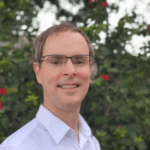One in ten girls in Sub-Saharan Africa miss school during their menstrual cycle, equating to as much as 20 per cent of a given school year. Some girls drop out of school entirely once they begin menstruating.
Lack of finances and access to proper sanitary products, as well as lack of information on reproductive health, means many girls and women resort to using unhygienic and ineffective materials to manage their periods, such as newspapers, pieces of foam mattresses, banana fibres and leaves. This can lead to health complications and discomfort, and prevents many girls and women from engaging in daily life.
Curtin commerce student Casey Hughes is helping to change the status quo. She spent eight weeks in Uganda developing a business plan to produce and distribute reusable sanitary pads to girls and women living in urban and rural Busia, a town that lies near the border between Uganda and Kenya.
Hughes developed the business plan during her internship with the not-for-profit organisation, Seeds of Hope Integrated Ministry (SHIM), which was organised through Development Together. A Curtin partner, Development Together that finds ethical and sustainable volunteer placements and work experience for individuals and groups.

“I applied for the internship because I wanted to try something new, challenge myself and give back to the community,” Hughes says.
“As part of the internship business plan, I conducted extensive research into why sanitary items were lacking in Busia – usually because they are too expensive or unheard of.
“I also had to evaluate what women wanted in a sanitary pad, examine current designs for reusable pads, and research materials, equipment, competitors and whether similar projects had been successful in the past.”
Hughes says that one of the more difficult aspects of putting together her business plan was surveying girls from a local school.
“I had to question more than 100 girls from Victory Primary School about their opinions on menstruation and reusable sanitary pads, which is an incredibly private topic in Uganda,” she says.
“I’m a shy person by nature, so I was so nervous about the girls not liking me or giving me honest answers. When I first started talking to them, my voice was shaking!
“But I realised that if I wanted to get the girls to open up, I had to improve my communication skills. By the end of it, I felt terrific. I had overcome my own fears and the girls gave me such incredible answers.”

Reusable pads can be a cost-effective and sustainable menstrual hygiene solution for many girls and women living in developed countries. They are made from fabric, can have removeable cotton inserts and are held in place with snap buttons. These materials are relatively cheap and the pads can be made on a sewing machine.
However, in Busia, Hughes found that many girls and women were not aware that sanitary pads were an option, or they were still too expensive to purchase.
Her plan devises ways for SHIM to increase its donations from sponsors so it can set up its own pad production and distribution. This will result in girls and women having access to sanitary pads that are well-made and significantly more affordable than any other pad product available.

To ensure that Busia girls and women can use the pads effectively and better understand menstruation, SHIM will continue to deliver its education program on sexual reproduction and sanitary health in local schools and communities.
“If SHIM implements my business plan, it will have a massive impact in Busia,” Hughes says.
“It may be hard for some people to fathom how something like this can hold back so many girls from attending school and having dignity, but it does.
“The production and distribution of reusable sanitary pads will make a difference to young girls and women, and also create jobs in the Busia community.”
Hughes says her internship was particularly tough at times, but it has reinforced her decision to pursue a career where she can help improve people’s quality of life.
“It definitely changed my outlook on the world, and has encouraged me to work harder in my studies so I can secure a job and have relevant knowledge to contribute even further than I have already.”
Hughes’ experience will give her credit towards the Business Capstone unit of her commerce degree, and she encourages students who are looking for authentic ways to create global change to apply for a Development Together program.
Turn your degree into a real career. Choose Commerce at Curtin.
Learn more



